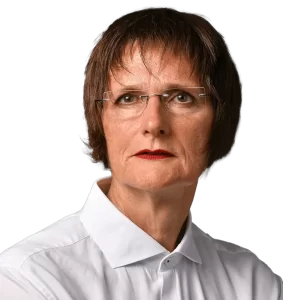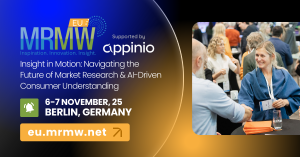Elevating Market Research: From Insight Generation to Strategic Impact
MRMW EU 2025 Speaker Interview
With the countdown to the annual MRMW EU gathering in Berlin, we’re sharing exclusive insights from industry thought leaders shaping the future of market research. In this edition, Dr. Susanne Wehde, Head of Consumer Centricity & Insights – tesa SE Management Unit Consumer, reflects on how insight generation is evolving, the impact of AI and digitalization, and the skills researchers need to deliver true strategic impact.

MRMW: What motivates you to join the MRMW EU conference and what is the core message of your talk?
Susanne: Staying up to date with new thinking, innovative tools and approaches in the market research industry is both a professional duty and a personal delight for me. I also love the exchange with colleagues. For both, the MRMW EU conference is a great opportunity.
My core message in the panel discussion on technological evolution and the proliferation of emerging tools in market research will be: evaluate and apply them with a knowledgeable, critical mind — as we should not only with new tools but also with our established ones. Embrace those that can prove they deliver more meaningful outcomes, elevating insight quality and further expanding our toolboxes.
MRMW: How has this impacted your own work and your organisation?
Susanne: My team and I at tesa have dedicated resources to training ourselves and to piloting and validating promising tools. The extended toolbox has enabled us to run more studies (= more fact base for marketing decisions), conduct studies more efficiently (= optimize budget and timeline), and gain more granular learnings (= unlocking deeper customer and user understanding).
An example: in close cooperation with tesa IT, we have developed and implemented an AI tool to analyse and report unstructured text data. This has since been successfully rolled out corporate-wide and enhances the scale and output of qualitative data analysis from surveys, CRM systems, reviews, or any other user-generated text content. It enables advanced trend identification and insight generation while saving time and resources.
MRMW: How has market research and insight as a practice evolved in the last couple of years, and how would you like to see it evolve in the next few?
Susanne: Oh, there have been many evolutions and revolutions. To pick two from an internal corporate perspective:
- As data sources have multiplied, data ownership within corporations has become increasingly fragmented, leading to silos, poor integration, and limited cross-functional collaboration.
How I would like to see market research evolve: into a truly integrated insight function, integrating classical survey and panel data with digital transactional data interpretation to boost joint insight capabilities — where 1+1 equals 3.
- The digitalisation of research and, more recently, the rise of AI have put the whole market research process under the mantra of ‘faster is better.’ As a result, teams often take too little time to optimise inputs and stimuli and don’t allow sufficient time to truly digest findings and reflect on their business implications and indicated actions.
How I would like to see market research evolve: the future should bring a deliberate slowdown. Faster insights aren’t always better insights — reflection is the real accelerator of business success.
MRMW: Given this evolution, what are two expected and two less obvious skills market researchers should possess, and why?
Susanne: Two obvious skills:
- Advanced data literacy and connecting the dots. Why?
Market researchers must be skilled at “reading” and interpreting the meaning of an ever-growing variety of data. They need to be able to act as hypothesis-led “interface managers” between data owners, working alongside data scientists to translate analytics outputs into business-relevant insights. This requires the ability to judge which datasets are suited to contribute to answering business questions.
An essential skill of market researchers has always been the ability to weave a narrative from research data points. Connecting the dots is becoming progressively more demanding, given the proliferation of available data and the interplay with generative AI. It is increasingly important to synthesise data from multiple sources, uncover the “story” within, identify business opportunities, and engagingly communicate these insights and their implications to different stakeholders.
- Psychological and behavioural science application. Why?
The role of market researchers will increasingly be to scrutinise, validate, and contextualise AI-generated outputs. To do so, market researchers will need a deep, highly nuanced understanding of psychology and behavioural science. This involves understanding cognitive biases, emotional triggers, and decision-making processes.
Two less obvious skills:
- Being able to engage and inspire others, rallying people from various functions behind a common project vision. Why?
To fully leverage the insight-generation potential from all the various data sources in a company, it is essential to spark enthusiasm for cross-functional collaboration and motivate colleagues from different disciplines to leave their functional-silo comfort zones and engage in new ways of collaborating.
- Driving data integrity and trust with a special focus on transparency, traceability, and ethics beyond legal and regulatory requirements. Why?
The proliferation of data sources and the use of AI bring significant challenges — not only regarding data privacy but also concerning algorithmic bias and its ethical and business implications. Researchers must safeguard trust in their research outcomes by building transparent methodologies, ensuring bias detection in AI-assisted research, and being able to clearly explain how and from where insights were derived.
MRMW: Apart from work, what can delegates at the event talk to you about? Do you have any particular personal interests, hobbies, or extracurricular activities and engagements?
Susanne: (Guerrilla) gardening, contemporary art/performance, free jazz, typography/graphic design.
MRMW: Last but not least, we are publishing “reading/listening guides” on our blog. Can you share your favourite recommendations for inspiration, learning, and leadership?
Susanne: In your ears – Podcast: My recommendation: follow special-interest podcast series from public service broadcasters and national newspapers, holding paid subscriptions to support independent journalism.
Must read – Book: Patrick Lencioni: The Five Dysfunctions of a Team
MRMW: Thank you so much, Susanne! We look forward to hearing more from you at MRMW in Berlin!
📍MRMW Europe Returns This Autumn!
Excited to hear Dr. Susanne Wehde share how her team at tesa transforms research into actionable insights, harnesses AI and digital tools, and drives real strategic value across the business?
You’re not alone. At MRMW EU 2025 (Nov 6–7, Berlin), you’ll hear from her and insights leaders at Scandinavian Tobacco Group, Salomon, Samsung, eBay, EDP and more—sharing real-world case studies, fresh research trends, and the strategies shaping tomorrow’s CX and market insights.
Join us for live discussions, cutting-edge case studies, round tables and interactive networking sessions. The unique MRMW concept provides the perfect balance between personal development, networking and doing business.
Reserve your seat now to connect with industry leaders and shape the future of insights!










 by
by 


